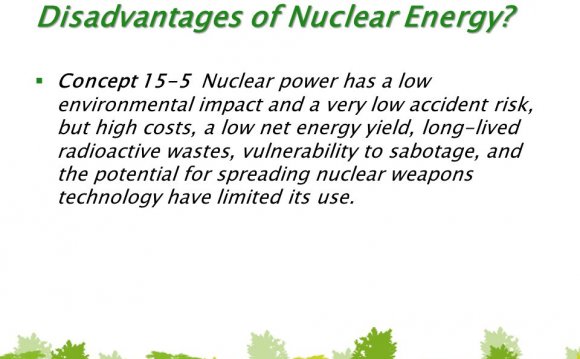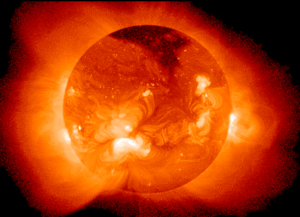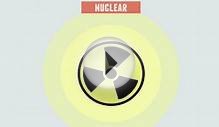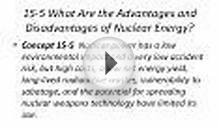
 Nuclear fusion is the process in which two or more lighter nuclei combine to form a single heavier nucleus whereas fission involves breaking up of a heavy nucleus into lighter nuclei. The common thing between the two is that they produce huge amounts of energy which is measured in Mev. The release of this huge amount of energy is given in Einstein’s relation of E=mc2. But the energy released by the Nuclear Fusion is 3- 4 times greater than fission because the mass transformed into energy is more. Nuclear fusion occurs in stars like the sun.
Nuclear fusion is the process in which two or more lighter nuclei combine to form a single heavier nucleus whereas fission involves breaking up of a heavy nucleus into lighter nuclei. The common thing between the two is that they produce huge amounts of energy which is measured in Mev. The release of this huge amount of energy is given in Einstein’s relation of E=mc2. But the energy released by the Nuclear Fusion is 3- 4 times greater than fission because the mass transformed into energy is more. Nuclear fusion occurs in stars like the sun.
Nuclear fusion requires extremely huge amounts of energy to bring the protons together to avoid electrostatic repulsion. It occurs only at very higher temperatures or higher pressures. The links of fusion process are protons. Nuclear fusion proceeds best with thermal particles where thermal means temperatures of millions of “0k”. While designing fusion power plants we use fusion reactions to create heat as we use coal in thermal plants, water in hydro plants. Best example of Nuclear fusion is Hydrogen bomb also called as thermonuclear bomb as it requires extremely high temperatures to initiate the fusion and atom bomb is an example of Nuclear fission. A good example is the fusion of two heavy isotopes of hydrogen deuterium: H2 and tritium: H3 into the element helium. Deuterium can be found in sea water whereas tritium from lithium which is available on earth’s crust.
Nuclear power plants are used for the production of electricity. After hydro, thermal, steam, nuclear power it is the fourth largest source in India. Nearly twenty nuclear plants are producing electricity in India and some more are under construction. Nuclear power station first started its operation in 1950 in England. Now around 440 commercial nuclear power reactors operate in 30 countries. Around sixteen countries depend on nuclear power for electricity.What are the advantages of Nuclear fusion?
- It is environmentally friendly as the radioactive emissions during the chain reaction are very less and can cause less damage because when Nuclear fusion reaction goes out of control, it stops automatically and cools down instead of vaporizing.
- It requires very less energy to split into two atoms.
- Energy is clean as there is no radioactive waste left behind.
- Fuel for Nuclear fusion reactions is readily available as fuels like deuterium and tritium are inexhaustible.
What are the disadvantages of Nuclear fusion?
- High maintenance costs
- Inability to control the energy released by the nuclear fusion process
In future there will be depletion of fossil fuels such as oil, gas and petrol etc., due to increase in population and their increasing demands, and it even causes more pollution by emission of green house gases causing global warming. Coming to solar energy which is also environmentally friendly providing safe and non polluted environment but it has limited usage depending on its geographical factors. Whereas nuclear fission which is also available in abundant but its waste disposal is in high levels and can be a threat to the environment. So finally coming to Nuclear fusion one can rely on these nuclear fuels as they can be available to us for some millions of years and its advantage of very less emissions of radioactive wastage and pollution free environment.
YOU MIGHT ALSO LIKE












